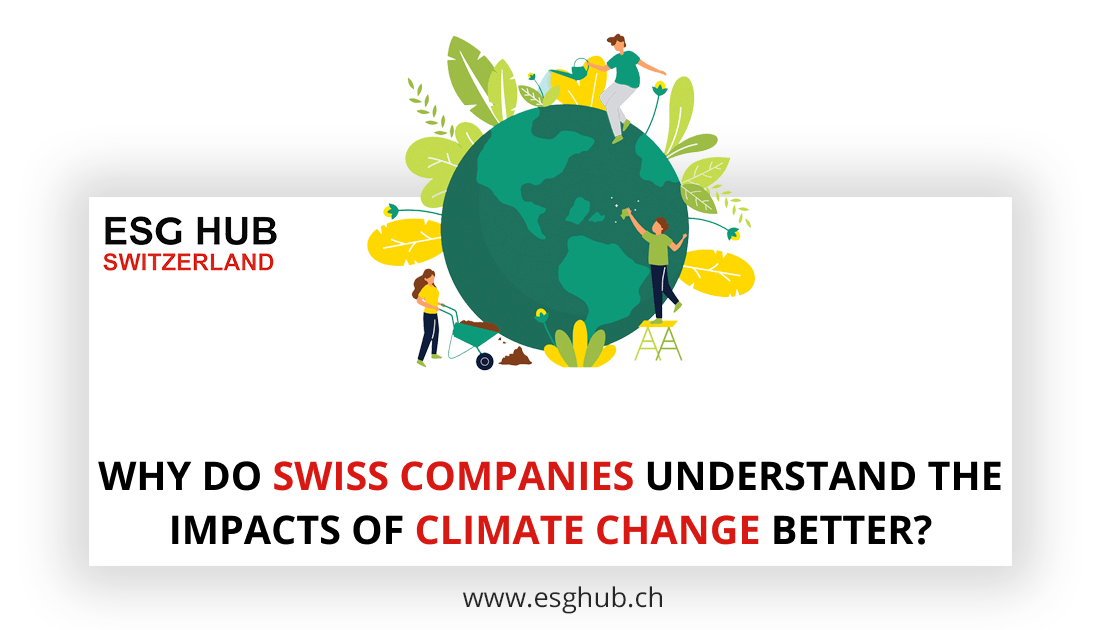Why do Swiss companies understand the impacts of climate change better?

“Climate change has significant impacts on businesses, and Swiss businesses are no exception.”
Switzerland is one of the world’s lowest greenhouse gas emitters, accounting for approximately 0.1% of current global greenhouse gas emissions. Despite this, Switzerland is significantly affected by climate change, both in terms of the actual rise in temperature and its consequences, which negatively impact society and business.
According to a recent survey, nearly twice as many executives in Switzerland believe global climate change is already causing irreparable harm. Eight out of ten executives (80%) agree that the world has reached a tipping point in responding to climate change. This demonstrates that the impact of climate change is being felt across industries. Businesses recognize the importance of reducing carbon emissions and incorporating more sustainable practices such as environmental, social, and governance (ESG) practices into their operations.
If you are still not concerned about how a changing climate might affect your operations, here are five reasons why climate change is becoming a serious risk and how your organization must stand against it.
1.Significant increase in operational expenses
According to analyses by the Intergovernmental Panel on Climate Change (IPCC), the physical impacts of climate change such as increased instances of floods, droughts, and heatwaves cause billions of dollars in damages for business facilities. A study by the European Central Bank (ECB) states that more than one-third of businesses believe climate change will force them to relocate some operations. Such significant increases in operating costs will directly impact companies’ profit margins. As they observe the direct impacts of climate change, businesses must take serious measures to address climate-related risks, such as setting net-zero emissions reduction targets.
2. Negatively impacting productivity
According to the IPCC, economic damages through heat-induced losses in labour productivity have been detected in climate-exposed sectors, with sectoral effects on agriculture, forestry, energy, and tourism. These are highly important sectors to the Swiss economy.
3. Extreme weather conditions
Extreme climate events are also seriously harming businesses. More than 1,200 CEOs from 113 countries and 21 industries were surveyed for a report by the UN Global Compact about changing weather patterns. Nearly half of CEOs said they are struggling with supply chain disruptions brought on by severe weather.
Climate-related disruptions in the supply chain of manufacturing, pharmaceuticals, retail, and other important sectors for Switzerland have a significant impact on business operations.
4. Changing consumer sentiments
Climate change is also influencing consumer attitudes toward businesses. Consumers are becoming more concerned about climate change. Recent data from Mintel indicates that climate change has become one of the top three environmental problems for consumers worldwide. Concerns about climate change increased from 39% to 46% between 2021 and 2022, making it the top environmental priority globally.
Heightened public awareness is driving businesses to work toward the goal of reducing the risks and impacts of climate change: incorporating ESG into businesses is one such step in that direction.
5. Complying with laws and regulations
Companies are under increasing pressure to invest in sustainability due to the regulatory environment becoming increasingly stringent.
For instance, the Swiss Federal Council has recently introduced the Swiss Climate Scores. The initiative aims to establish best-practice transparency on the alignment of financial investments with the Paris Climate Agreement to foster investment decisions that contribute to reaching these climate goals. Both investors and investee companies will be affected by the initiative.
The European Union (EU) is also introducing new reporting and disclosure requirements on businesses in relation to their sustainability and climate activities. Hence, companies need to implement business strategies to address the regulatory risks of climate change.
How to respond to these risks
1. Consider the environment in all business decisions
Climate change should be at the forefront of corporate and public-sector decision-making. This means that when allocating capital, developing products or services, or managing the supply chain, businesses must take climate change into account. Your company must adapt ESG strategies, business models, and tools to account for the present and future impacts of climate change.
2. Enhance coordination across business units
To address climate change, businesses must make coordinated efforts across business units. Although organisations are now investing in sustainability departments, we observe the fragmentation of sustainability-related mandates across business units. We recommend that your company invest in a cross-departmental institutional approach to make sure that your business, employees, and assets are resilient against the physical and transition risks of climate change.
3. Large-scale reduction of carbon emissions
All businesses must decarbonize on a massive scale for the world to be on a Paris-aligned pathway to future sustainability. Committing to a net-zero target is becoming a business norm. We recommend committing to science-based target initiatives and getting your commitments validated by credible organizations.
In conclusion, having a strategy that will reduce your company’s carbon footprint while making it more resilient to the impacts of climate change will be essential in the coming years. Many businesses have begun to work in this direction and are already seeing the benefits of their investments in the form of reduced operational costs, greater resilience, and lower regulatory burdens. These businesses are also building long-term trust and credibility with investors and clients.
Please let us know if your organisation needs help with designing and executing a climate strategy.